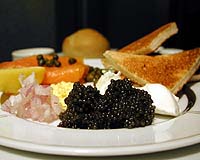 |
Washington (AFP) March 22, 2010 Eating less meat will not reduce global warming, and claims that it will distract from efforts to find real solutions to climate change, a leading air quality expert said Monday. "We certainly can reduce our greenhouse gas production, but not by consuming less meat and milk," Frank Mitloehner, an air quality expert at the University of California-Davis, said as he presented a report on meat-eating and climate change at a conference of the American Chemical Society in California. Blaming cows and pigs for climate change is scientifically inaccurate, said Mitloehner, dismissing several reports, including one issued in 2006 by the United Nations, which he said overstate the role that livestock play in global warming. The UN report "Livestock's Long Shadow," which said livestock cause more greenhouse gases than all global transportation combined, distracts from the real issues involved in looking for a solution to global warming, said Mitloehner. The notion that eating less meat will help to combat climate change has spawned campaigns for "meatless Mondays" and a European campaign launched late last year called "Less Meat = Less Heat," backed by former Beatle Paul McCartney, one of the world's best-known vegetarians. "McCartney and others seem to be well-intentioned but not well-schooled in the complex relationships among human activities, animal digestion, food production and atmospheric chemistry," said Mitloehner. "Smarter animal farming, not less farming, will equal less heat," Mitloehner said. "Producing less meat and milk will only mean more hunger in poor countries," he said. Rather than focusing on producing and eating less meat, Mitloehner said developed countries "should focus on cutting our use of oil and coal for electricity, heating and vehicle fuels." In the United States, transportation creates an estimated 26 percent of all greenhouse gas emissions, whereas raising cattle and pigs for food accounts for about three percent, he said. The UN report, issued in 2006, said global livestock rearing was responsible for 18 percent of greenhouse gas emissions measured in carbon dioxide equivalents. The UN report said that was more than the greenhouse gases produced worldwide by transport. Mitloehner said the UN report did not compare like with like when it analyzed the role of livestock versus fossil fuel emissions in spurring global warming.
Share This Article With Planet Earth
Related Links Farming Today - Suppliers and Technology
 Sturgeon's plight amid caviar boom stokes conservation row
Sturgeon's plight amid caviar boom stokes conservation rowDoha (AFP) March 19, 2010 A catastrophic fall in wild sturgeon numbers even as more and more of its lucrative caviar is farmed has stoked a bitter row over the best means of conservation - managed catch or outright ban. No one disputes the sturgeon is in big trouble. In a report issued on the sidelines of a UN wildlife conference in the Qatari capital Doha, the International Union for Conservation of Nature warn ... read more |
|
| The content herein, unless otherwise known to be public domain, are Copyright 1995-2010 - SpaceDaily. AFP and UPI Wire Stories are copyright Agence France-Presse and United Press International. ESA Portal Reports are copyright European Space Agency. All NASA sourced material is public domain. Additional copyrights may apply in whole or part to other bona fide parties. Advertising does not imply endorsement,agreement or approval of any opinions, statements or information provided by SpaceDaily on any Web page published or hosted by SpaceDaily. Privacy Statement |